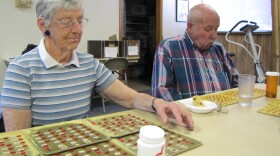Retirement Redefined, a series of multimedia stories, looks at the changing nature of the golden years.
Prescott, Arizona, often lands on top 10 lists for best places to retire. The charming cowboy town boasts the world’s oldest rodeo and more than 800 buildings on the National Register of Historic Places. Its mild climate, continuing education opportunities, golf courses, hiking trails and affordable homes also appeal to folks.
“Come to Prescott any day of the week and you’ll see the future of an aging society,” said Dennis Garvey, gerontologist and director of Yavapai College’s Center for Successful Aging. “We look like, given our demographics, the rest of the country is going to look in the year 2030.”
That’s when close to one in four people will be over age 65 across the country. Currently only 13 percent of Americans have reached retirement age.
Percentage of people 65 or older who make up the workforce in 2011: 16. Number of people 65 and older who were in the labor force in 2009: 6.5 million.
Larry Prochnau and his wife chose to retire in Prescott after teaching high school for more than three decades in Phoenix.
Prochnau is still living the retirement dream thanks to his state pension.
“I used to gripe about my salary as a teacher,” Prochnau said. “Now that I’ve retired and I have a decent pension, Oh, I feel truly blessed.”
However, Prochnau’s traditional pension plan is becoming a thing of the past. Many employers in the public sector are reigning in the amount they promise workers.
Fewer Americans today envision living out their golden years hiking and playing golf like Prochnau. In fact, according to a recent study, more than half of the 55 and older crowd are struggling to retire. As baby boomers reach retirement age, many are facing diminished 401(k)s, dwindling entitlements and growing medical bills.
Like many others, Prochnau lost thousands of dollars in the stock market. But he and his wife were frugal, paying for almost everything in cash, buying all their furniture at garage sales.
“I have friends that lost as much as $500,000,” Prochnau said. “When the economy took a dive, God, it was just awful what happened to most people’s money.”
Those friends have had to sell their homes and the money they thought they’d leave their kids is gone. Most 401(k) participants lost on average about 10 percent in 2008.
“Right now a lot of people are going back to work who are my age," he said. "That’s sad seeing ‘em in convenience stores. The job market is saturated."
That’s just what Travon Nistal has found. She is working part-time as a receptionist, a job she’s way overqualified for. She was an IT specialist for many years.
“I made good money and I saved a lot of it," Nistal said. "But it goes away quickly."
She had planned to consult, travel and spend time with her children and grandchildren. But a rare auto immune disease has changed all that. Now she has to stay close to a hospital that provides her chemo. And the treatments are expensive.
She said one infusion of this drug is $15,000.
About a million older Americans face bankruptcy due to medical bills, according to the American Bankruptcy Institute.
Medicare and disability have helped Nistal a little, but they don’t cover everything. She doesn’t even want to know the total amount she owes.
“I’m on a payment plan forever. It’s been a big adjustment," Nistal said. "I’m far enough into the disease where I’ve gotten past the anger and ‘Why me?’ part.
She is now figuring out the best way to redefine herself.
"The adjustment now is not letting it control my life," Nistal said. "How do I have the best life I can with what I have to work with?”
Ironically, the tanked economy has made people plan for retirement more realistically and prepare for the unexpected. Ken Dychtwald, the author of 16 books on aging, said more and more people are living within their means and trying to create a more responsible financial approach that will prepare them to go the distance.
“I actually feel, although the pain of the recession is partly what has jolted people into these more responsible behaviors, we’re probably all going to be better off as a result,” he said.







